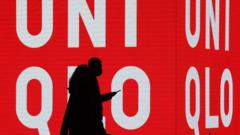Uniqlo's CEO stated in a BBC interview that the retailer does not use cotton sourced from Xinjiang, provoking a strong online backlash and calls for a boycott in China. The remarks come against the backdrop of ongoing controversies surrounding forced labor allegations linked to the cotton industry in the region.
Uniqlo Faces Consumer Backlash in China Over Cotton Sourcing Controversy

Uniqlo Faces Consumer Backlash in China Over Cotton Sourcing Controversy
The popular Japanese retailer Uniqlo encounters mounting criticism in China after comments from its CEO regarding Xinjiang cotton sourcing.
Uniqlo's recent comments concerning its sourcing of cotton have ignited significant backlash within China. Tadashi Yanai, the chief executive of Fast Retailing, Uniqlo's parent company, disclosed in a BBC interview that the retailer does not use cotton from the contentious Xinjiang region. This statement has led to widespread criticism and prompts for a boycott among Chinese consumers, particularly due to the ongoing allegations of forced labor involving the Muslim Uyghur minority in Xinjiang, which Beijing has consistently denied.
Following Yanai's remarks, social media platforms, especially Weibo, became a battleground for opinions on the issue. Many users rallied under trending hashtags such as “Controversy over Uniqlo founder’s remarks” and “I support Xinjiang cotton,” calling for a unified boycott of the brand. One angry commenter asserted that Uniqlo's "arrogant" stance might lead them to underestimate consumers' resolve to react.
Uniqlo's significance in China extends beyond a mere retail presence; the country is a vital market and manufacturing base for the company. Yanai’s decision to publicly highlight their non-use of Xinjiang cotton—and the hesitance to delve deeper into the political implications—indicates the company is walking a tightrope in a highly charged political environment.
This is not an isolated case, as several global brands have found themselves in hot water over their cotton sourcing policies. H&M faced a backlash and withdrawal from major Chinese e-commerce platforms after refusing to source Xinjiang cotton. Similarly, the commerce ministry in China has investigated companies like PVH, the parent firm of Calvin Klein and Tommy Hilfiger, allegedly due to unjust boycotts of Xinjiang products.
The evolving landscape suggests that multinational companies continue to face challenges when navigating their global operations against a backdrop of political and social controversies.

















